When comparing different options to choose the right eCommerce platform for your business, you might encounter Oracle Commerce vs Magento. Both platforms stand out as prominent names in the industry, but there are several differences that can significantly impact your choice.
In this article, we'll compare Oracle Commerce vs Magento in details, including:
- Cost of ownership
- Ease of use
- B2B features
- Inventory management
- Payment gateways
- Customization options
- Security & compliance
- Support
Without further delays, let's get started!
Oracle Commerce vs Magento – An Overview
Oracle Commerce overview
Oracle Commerce is a robust eCommerce platform specifically designed for large-scale enterprises. It is widely recognized for its ability to handle complex business needs, making it a preferred choice for organizations with high transaction volumes and diverse product catalogs.
As part of the Oracle ecosystem, this platform offers seamless integration with Oracle’s other solutions, including cloud services, database management, and enterprise resource planning (ERP) systems. These integrations provide businesses with a unified system to manage their operations efficiently, from inventory control to customer relationship management.
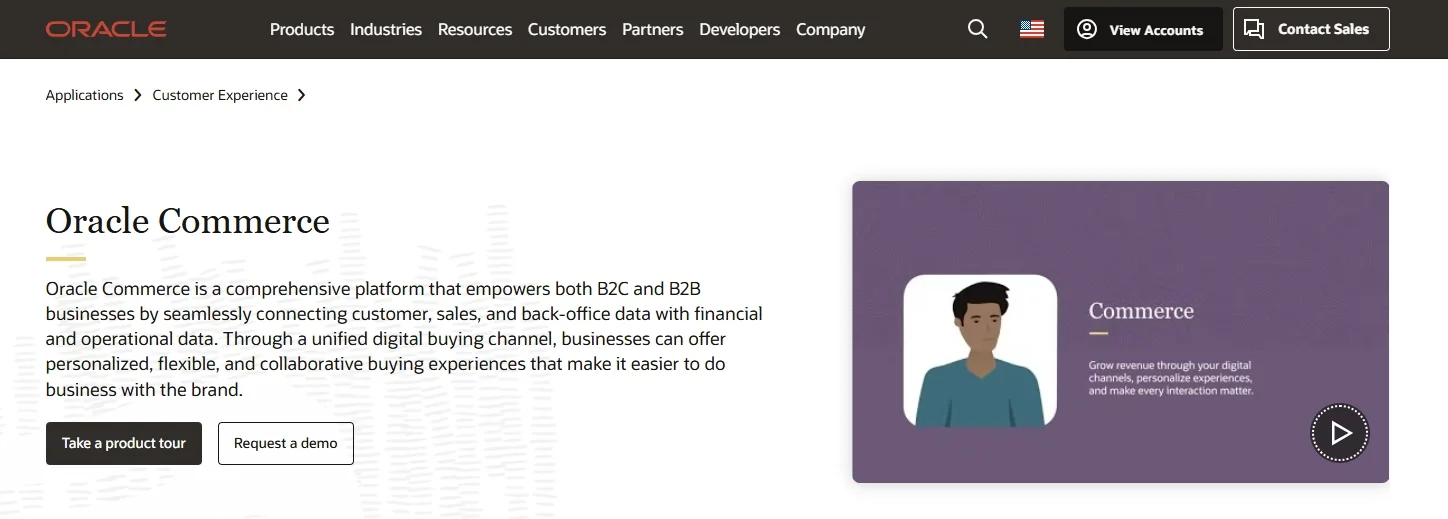
From what we have observed, Oracle Commerce is best suited for businesses with significant technical expertise and resources. The platform's complexity often requires a dedicated IT team or the assistance of external consultants to manage implementation, customization, and maintenance. Additionally, its licensing and operational costs may be higher than some alternatives, making it a better fit for organizations that prioritize performance and scalability over cost-efficiency.
Magento overview
Magento, now part of Adobe Commerce, is a highly flexible eCommerce platform designed to meet the needs of businesses of all sizes. It is particularly popular among small and medium-sized businesses, as well as enterprises seeking extensive customization options.
Magento offers two main versions: an open-source edition, which is free to download and use, and the Adobe Commerce Cloud version, which includes additional features and premium support. This flexibility allows businesses to choose a solution that aligns with their budget and operational needs.
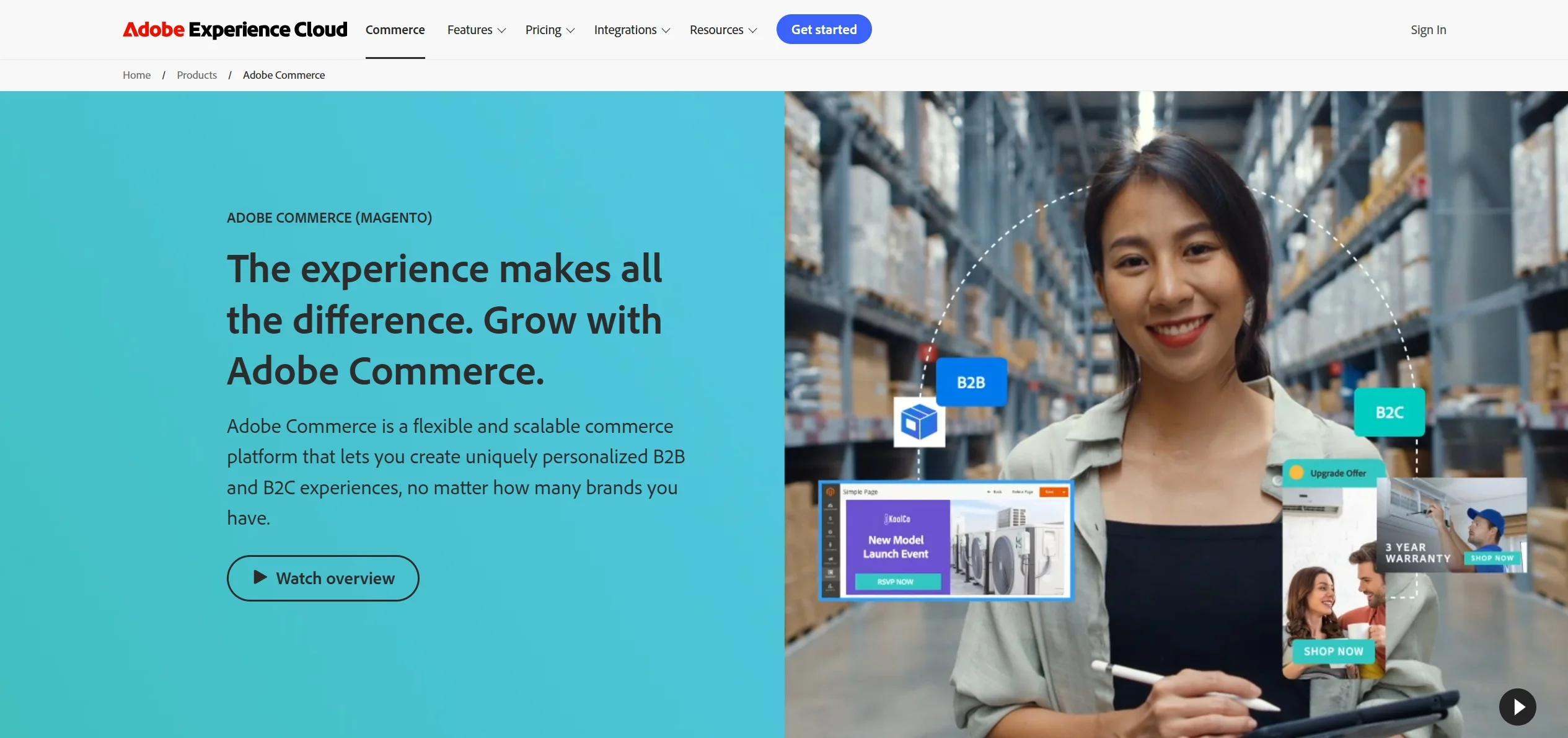
Overall, Magento offers a powerful and flexible solution for businesses looking to create a highly customized eCommerce store. Its scalability and extensive feature set make it an excellent choice for businesses with ambitious growth plans or unique operational requirements.
➤ If you want to learn more about Magento, don't forget to check out our relevant resources here:
Oracle Commerce vs Magento – Which one should you choose?
When deciding between Oracle Commerce vs Magento, it’s important to consider your business size, technical resources, and long-term goals. Both platforms cater to different types of users and business needs, but the question is, which one is ideal for your business?
To conclude, Oracle Commerce is best for enterprises with complex eCommerce needs, a significant budget, and access to technical resources. Its advanced tools and scalability make it a strong choice for large-scale operations. Meanwhile, Magento is a versatile platform suitable for businesses of all sizes, offering flexibility, cost-effectiveness, and robust customization options.
Oracle Commerce vs Magento – All The Key Differences
Choosing between Oracle Commerce and Magento can feel overwhelming, as both platforms offer unique advantages tailored to specific business needs. To help you make an informed choice, the table below will compare Oracle Commerce vs Magento across key criteria:
Criteria | Oracle Commerce | Magento | The winner |
Cost of ownership | High initial licensing fees and ongoing operational costs. | Free to install but requires additional costs for configuration. | Magento |
Ease of use | Requires significant technical expertise. Not beginner-friendly. | Moderate learning curve. | Magento |
B2B features | Comprehensive B2B tools such as account management, bulk pricing, and contracts. | Strong B2B capabilities with add-ons and extensions. | Oracle Commerce |
Inventory management | Advanced tools for managing large and complex inventories at scale. | Robust built-in inventory management with support for multi-warehouse setups. | A tie |
Payment options | Limited flexibility; primarily supports major payment gateways and Oracle tools. | Extensive payment gateway integrations and support for regional and niche solutions. | Magento |
Customization options | Limited flexibility; requires significant development for customization. | Highly customizable with extensive themes, extensions, and developer-friendly architecture. | Magento |
SEO & Marketing | Strong built-in marketing tools; best for personalized campaigns. | SEO-optimized out of the box, with advanced marketing tools available via extensions. | Magento |
Security & Compliance | Enterprise-grade security with compliance for global standards like GDPR and PCI. | Strong security features; additional measures often require third-party modules or development. | Oracle Commerce |
Support | Dedicated enterprise-level support with SLA agreements. | Community support via forums. | Oracle Commerce |
Now that we've caught a glimpse of all the main differences between Oracle Commerce vs Magento, let's get into the detailed comparison of these two platforms.
Cost of Ownership
When evaluating Oracle Commerce and Magento, the cost of ownership is a critical factor. Both platforms cater to different business types and budgets, offering unique pricing structures that can impact your financial planning significantly.
Oracle Commerce is designed for large enterprises, and its cost reflects its premium positioning in the market. The platform involves high upfront and ongoing expenses, making it better suited for businesses with substantial financial resources. Below is the full breakdown of Oracle Commerce pricing.
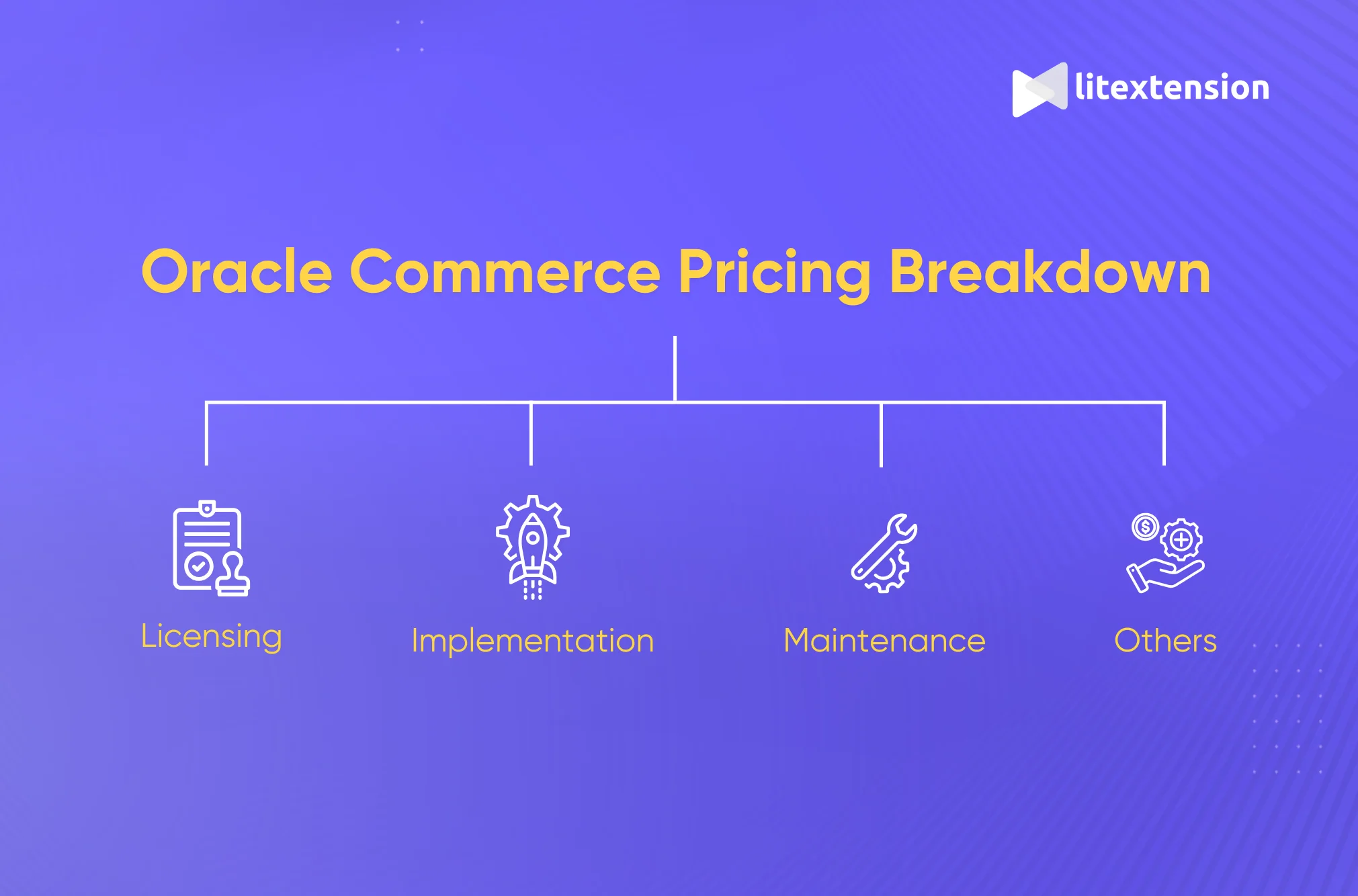
- Licensing cost: Oracle Commerce operates on a licensing model, which typically involves significant fees. These costs provide access to the platform’s advanced features, enterprise-grade tools, and integrations.
- Implementation cost: Implementing Oracle Commerce requires a dedicated IT team or the assistance of external consultants. The platform’s complexity demands expertise for initial setup, customization, and integration with existing systems. This adds another layer of expense that businesses must account for.
- Maintenance costs: Beyond implementation, businesses must invest in regular system maintenance. This includes updates, performance optimization, and support for third-party integrations. Hosting costs may also be higher due to the platform’s resource-intensive nature.
- Additional costs: Oracle Commerce often works best when integrated with other Oracle solutions, such as Oracle ERP or BI tools. While these integrations enhance functionality, they come with additional licensing or subscription fees.
On the other hand, Magento provides a more budget-friendly alternative, making it a popular choice for medium-sized businesses. While the platform itself is free to download and use, businesses should be aware of the associated costs for a complete eCommerce setup.
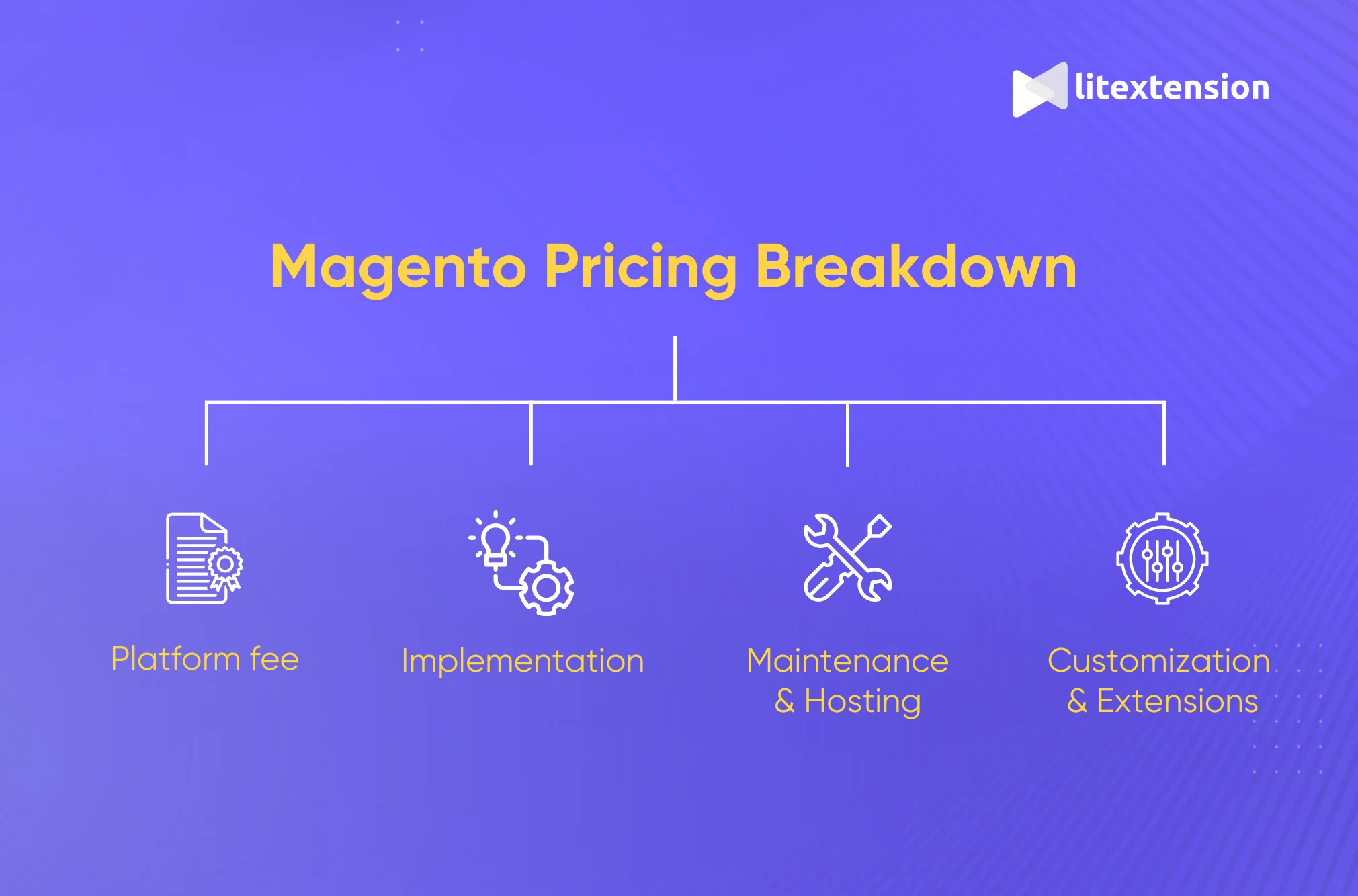
- Platform costs: The open-source version of Magento is free, giving businesses access to a flexible and feature-rich eCommerce platform without licensing fees. This allows companies to allocate their budgets to other areas, such as marketing or development.
- Implementation costs: Although the platform is cost-effective, implementing Magento requires technical expertise. Businesses may need to hire developers or partner with agencies to set up and customize the platform. This cost can vary significantly based on the level of customization and complexity required.
- Maintenance and hosting: Unlike Oracle Commerce, Magento does not include hosting as part of the platform. Businesses must select and pay for their hosting providers, with costs depending on traffic and storage needs. Additionally, regular updates and security patches need to be managed, which may require ongoing technical support.
- Customization and extensions: While Magento offers extensive customization options, businesses often need to purchase premium themes, extensions, or modules to enhance functionality. These additional expenses can add up, depending on the specific features required.
➤ The verdict:
When it comes to the cost of ownership, the choice between Oracle Commerce vs Magento depends on your business’s size and financial resources. Though both platforms' pricing is not fixed, we believe Magento might be the winner for medium-sized businesses. It presents a more cost-effective option than its counterpart while offering a good suite of eCommerce features to support your business growth.
Ease of Use
Another criterion that we need to mention when comparing Oracle Commerce vs Magento is their ease of use. Both Oracle Commerce and Magento offer powerful tools, but their user-friendliness varies significantly depending on their target audience and functionality.
Oracle Commerce is tailored for enterprises and reflects this focus in its complexity. The platform provides a comprehensive admin dashboard packed with advanced features, but it is not intuitive for users without technical expertise. Managing products, processing orders, or configuring system settings often requires specialized knowledge or training.
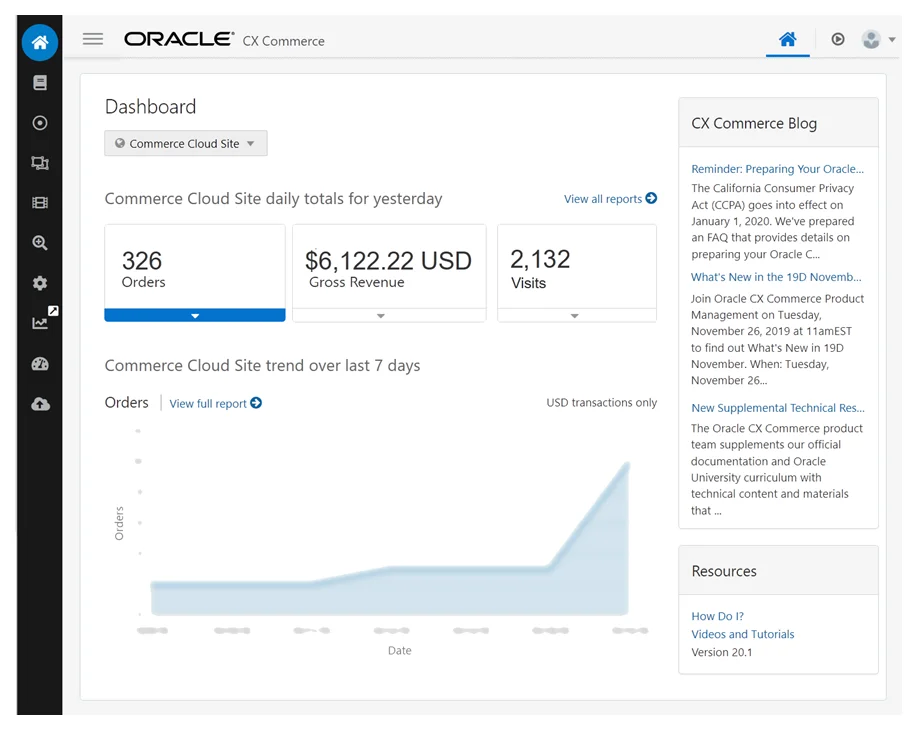
Oracle Commerce has a steep learning curve, making it challenging for businesses without dedicated IT teams. Furthermore, the platform’s implementation and maintenance demand significant technical expertise, often necessitating external consultants or an experienced in-house team to manage operations effectively.
On the other hand, Magento strikes a balance between functionality and usability. While it may not be as beginner-friendly as other hosted solutions like Shopify or Wix, it is considerably easier to navigate compared to Oracle Commerce. The admin panel is designed with usability in mind, enabling users to manage products, orders, and customer interactions without extensive training.
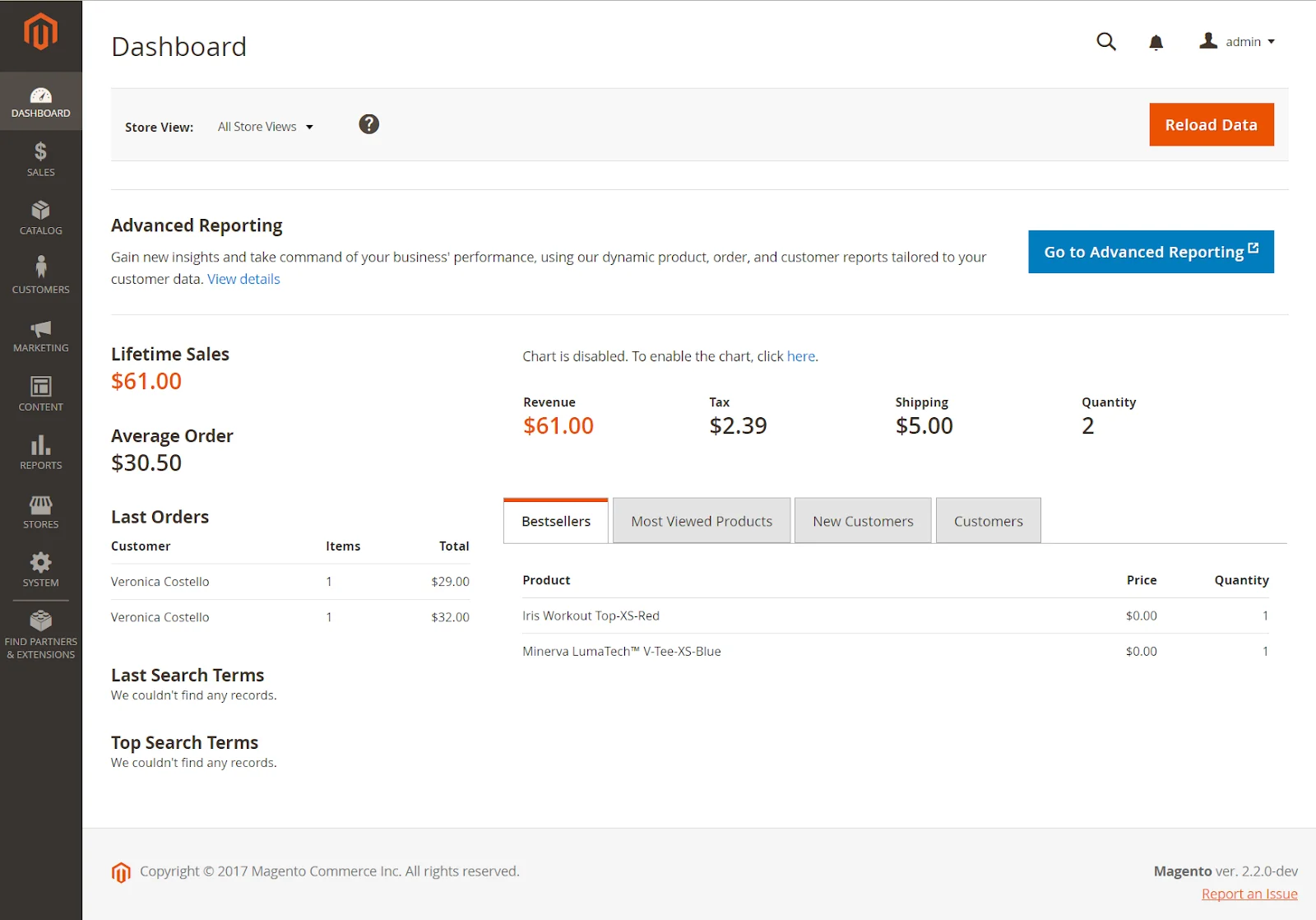
Though customization requires some technical expertise, Magento’s modular structure and vast community support make it more approachable for smaller teams. Maintenance tasks, such as updates and security patches, are manageable for businesses with basic technical knowledge or access to external support.
➤ The verdict:
Between Oracle Commerce vs Magento in ease of use, Magento takes the lead. Its combination of intuitive design, manageable learning curve, and flexibility makes it accessible to a wider range of businesses, including those with limited technical expertise.
eCommerce Functions
B2B features
B2B eCommerce requires advanced features to handle the complexity of business-to-business transactions, including bulk ordering, customized pricing, and account management. Both Oracle Commerce vs Magento offer tools to cater to B2B needs, but their approaches and depth of functionality differ.
Oracle Commerce is designed with enterprises in mind, making it exceptionally well-suited for B2B operations. The platform provides robust account management tools that allow businesses to create and manage multiple customer accounts with varying levels of access. Besides, its pricing capabilities are highly advanced, supporting complex pricing models such as volume discounts, tiered pricing, contract-based agreements, and subscription-based structures.
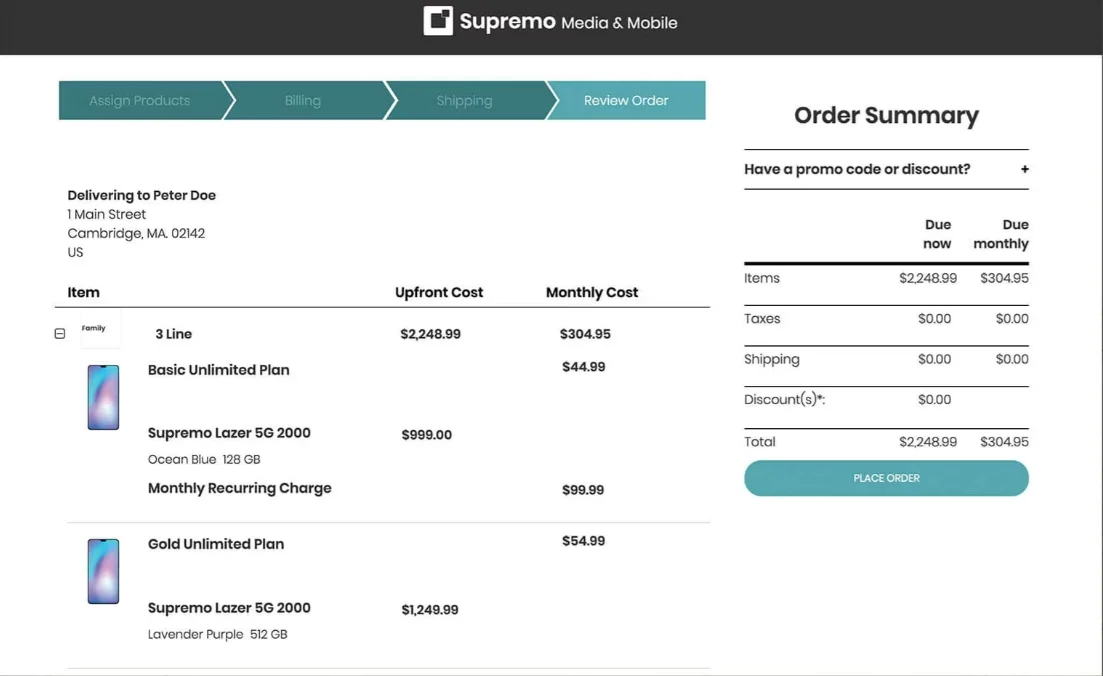
Oracle Commerce also integrates seamlessly with other Oracle solutions, such as ERP systems, enabling businesses to streamline operations like order management, inventory tracking, and invoicing. Additionally, its advanced personalization tools enable businesses to deliver tailored shopping experiences to different customer segments, which is crucial for B2B success.
On another note, Magento also supports B2B transactions, though its features may not be as comprehensive out of the box. Businesses can leverage extensions to add advanced B2B capabilities such as bulk ordering, custom pricing, and account management. Magento’s flexible architecture allows developers to create tailored B2B solutions, which can be particularly useful for businesses with specific requirements.
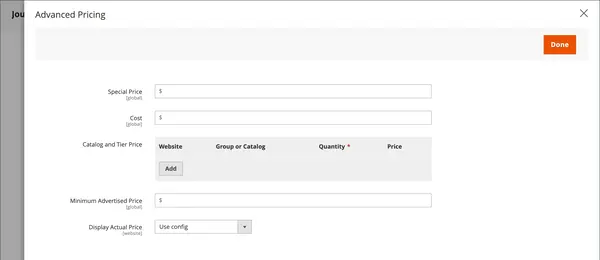
Additionally, Magento’s ability to support multi-channel selling enables businesses to manage both B2B and B2C operations from a single platform. For the full list of Magento features, please check out our article here.
➤ The verdict:
When comparing Oracle Commerce vs Magento in terms of B2B features, Oracle Commerce takes the lead with its robust, built-in tools designed for large enterprises. Its advanced capabilities, such as contract pricing, multi-account management, and seamless integration with other Oracle systems, make it ideal for businesses with complex B2B needs.
Inventory management
Efficient inventory management is a cornerstone of successful eCommerce operations, ensuring businesses can track stock levels, prevent over- or under-stocking, and streamline order fulfillment. Therefore, the next criterion we want to discuss in the Oracle Commerce vs Magento comparison today is inventory management.
Oracle Commerce provides enterprise-grade inventory management tools designed for businesses operating at scale. The platform supports real-time inventory tracking, allowing businesses to monitor stock levels across multiple locations seamlessly. Its advanced inventory management system integrates with Oracle’s ERP solutions, enabling businesses to synchronize inventory data with other operational workflows such as procurement and logistics.
In contrast, Magento offers robust inventory management capabilities, albeit with a focus on flexibility and modularity. The platform supports features like stock tracking, low-stock alerts, and multi-warehouse management, making it suitable for businesses with diverse inventory needs. Magento’s inventory management tools are easy to customize, allowing businesses to tailor them to their unique operational requirements.
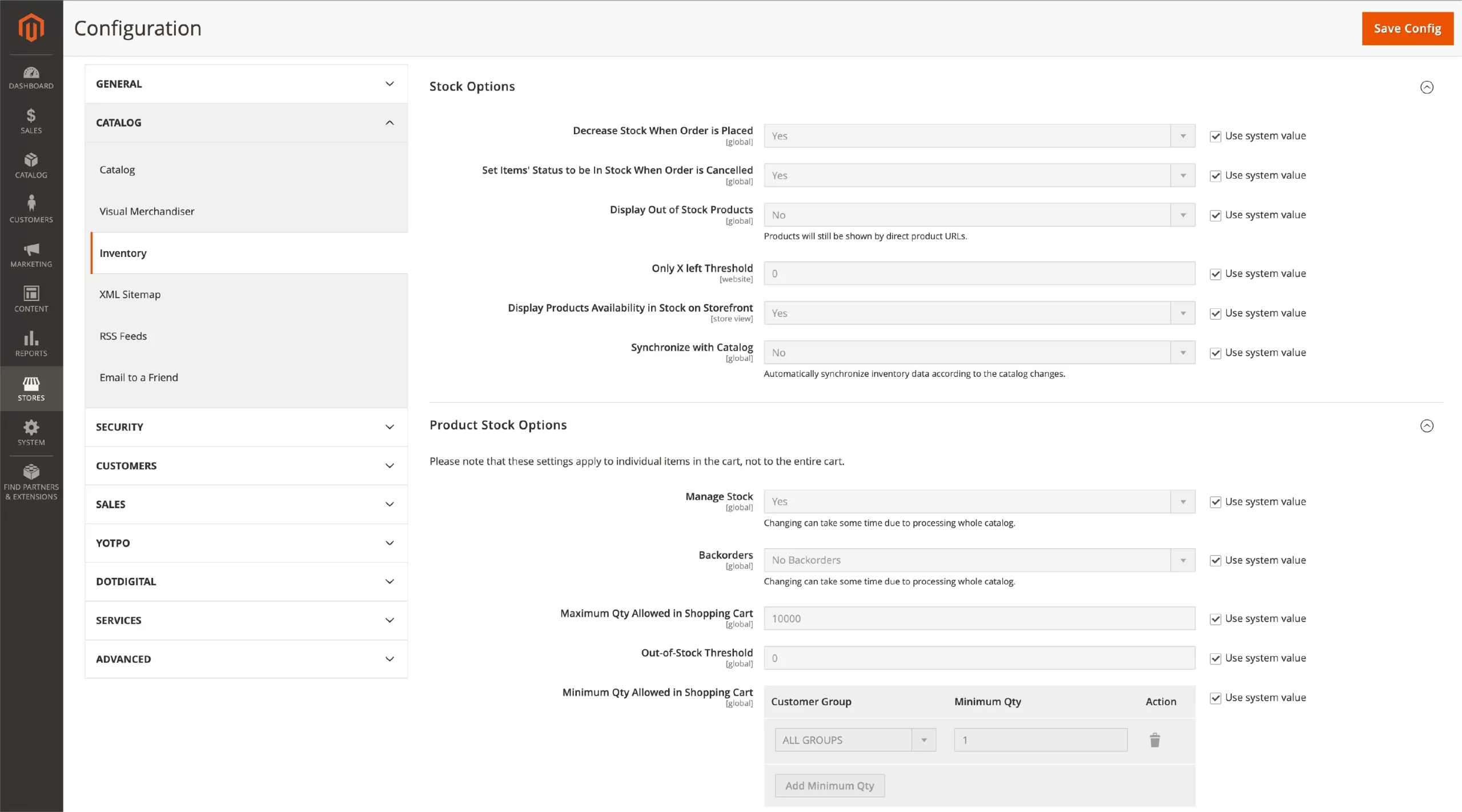
Nonetheless, while these features are sufficient for most small to medium-sized businesses, more advanced functionalities, such as automated restocking or detailed supply chain tracking, may require third-party extensions.
➤ The verdict:
In terms of inventory management between Oracle Commerce vs Magento, Oracle Commerce excels in handling the needs of large-scale operations. Its seamless integration with Oracle’s ERP systems and real-time tracking capabilities make it a superior choice for enterprises with complex supply chains or global inventory management requirements.
Payment gateways
Payment options are a critical factor in eCommerce, as they directly impact the customer experience and the ability to serve diverse markets. Both Oracle Commerce vs Magento provide payment functionalities, but their flexibility and range of options differ.
Oracle Commerce offers a solid set of payment capabilities, primarily focused on supporting major global payment gateways. The platform integrates seamlessly with Oracle’s suite of tools, such as Oracle Payment Interface (OPI), which enables secure transactions. Oracle Commerce supports standard payment methods, including credit and debit cards, as well as enterprise-level payment processing features like invoicing and recurring payments.
On the contrary, Magento shines in its flexibility when it comes to payment options. The platform supports a vast array of payment gateways and methods, ranging from traditional credit cards to digital wallets and local payment solutions. With access to hundreds of third-party extensions, Magento allows businesses to integrate additional payment providers without extensive development easily.
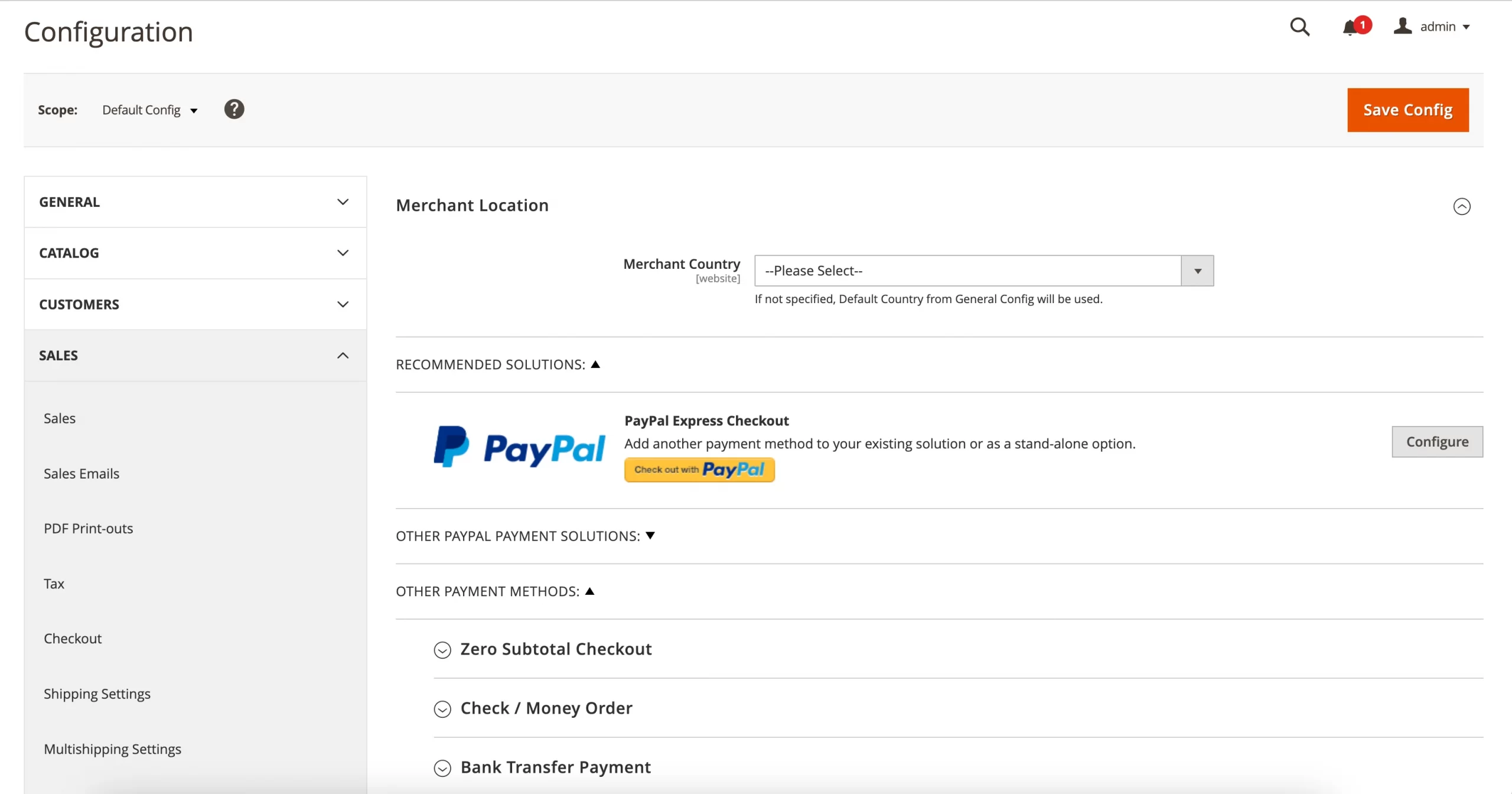
This flexibility is particularly beneficial for businesses serving diverse international markets, as they can tailor payment options to meet regional preferences.
➤ The verdict:
When it comes to Oracle Commerce vs Magento in terms of payment options, Magento takes the lead due to its flexibility and extensive range of integrations. Businesses can easily customize their payment systems to cater to diverse customer bases, making it an ideal choice for medium-sized businesses or enterprises with complex payment needs.
Customization Options
The ability to customize an eCommerce platform is critical for businesses looking to create unique shopping experiences tailored to their branding and operational needs. Both Oracle Commerce vs Magento offer customization options, but their approaches differ in terms of flexibility, complexity, and accessibility.
Oracle Commerce provides powerful customization capabilities, but these are deeply embedded within its enterprise-grade framework. Customizing the platform typically requires significant technical expertise and a thorough understanding of Oracle’s ecosystem. Businesses can tailor workflows, user interfaces, and functionalities to fit their specific requirements, but the process often involves complex coding and development. On top of that, Oracle Commerce is particularly strong in integrating with other Oracle products, allowing for seamless customization across a unified ecosystem.
On the contrary, Magento is renowned for its flexibility and developer-friendly architecture, making it one of the most customizable eCommerce platforms available. Its open-source nature allows businesses to modify the core code to implement unique features and functionality. Additionally, Magento has an extensive library of themes and extensions, enabling businesses to enhance their store without starting from scratch.
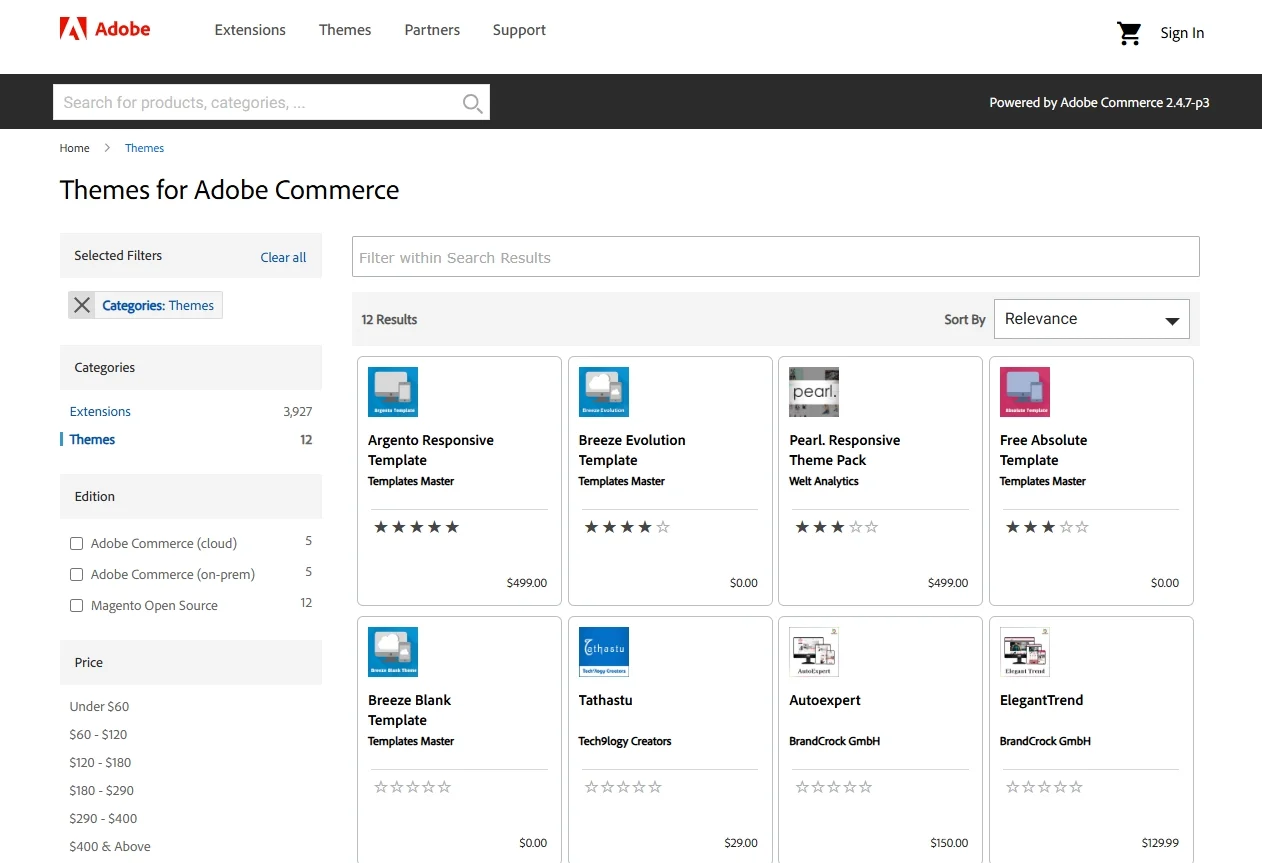
The platform also supports a wide range of third-party integrations, giving businesses the freedom to connect tools and services tailored to their operations. While customization still requires technical expertise, Magento’s active developer community and detailed documentation make it easier for businesses to find support or outsource development when needed.
➤ The verdict:
When comparing customization options between Oracle Commerce vs Magento, Magento clearly outpaces Oracle Commerce. Its open-source nature, extensive extension marketplace, and developer-friendly framework make it ideal for businesses of all sizes looking to create a highly personalized eCommerce experience. Magento’s flexibility allows businesses to implement unique features and adapt quickly to changing needs, all while benefiting from cost-effective customization options.
Security & Compliance
Security and compliance are critical considerations for any eCommerce platform. That's why we cannot miss this criterion in today's Oracle Commerce vs Magento comparison.
Oracle Commerce offers advanced security measures designed to handle complex business environments. It includes built-in protections such as encryption, firewalls, and access controls to secure sensitive data. Oracle Commerce is compliant with major regulations, including PCI DSS, GDPR, and CCPA, making it suitable for businesses operating in diverse markets with stringent legal requirements.
Additionally, Oracle’s platform integrates seamlessly with its broader ecosystem, ensuring consistent security across all connected systems. Many Oracle users benefit from proactive monitoring and threat detection, often provided as part of its support packages.

On another note, Magento also emphasizes security but offers a more flexible, modular framework. It provides key protections such as two-factor authentication, CAPTCHA, and PCI compliance readiness. More advanced features, like custom firewalls or specific compliance tools, can be implemented manually or through third-party extensions.
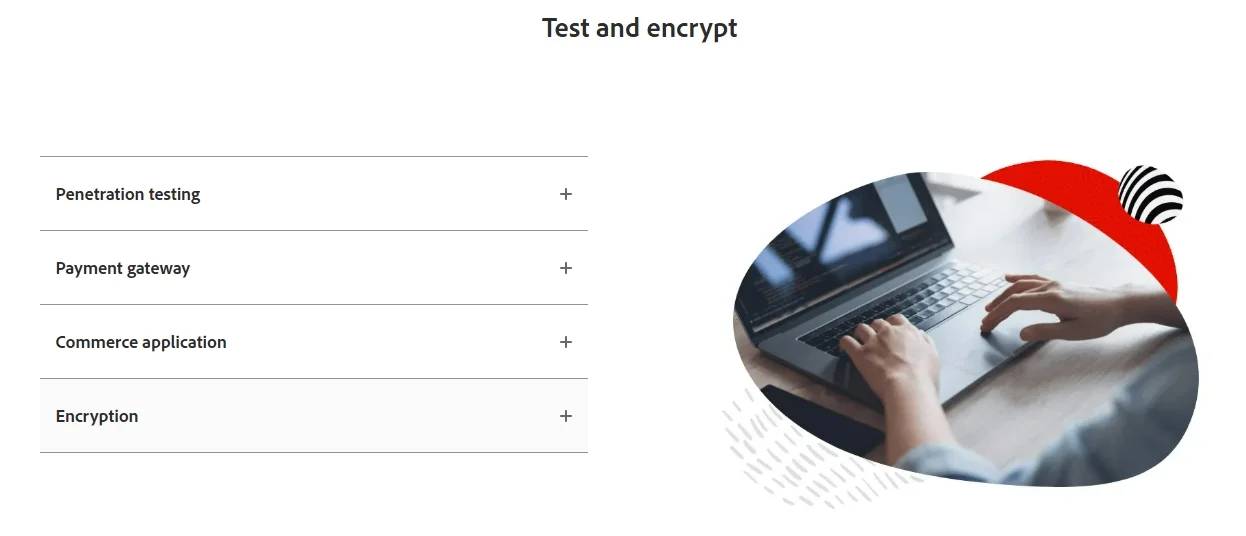
With that being said, Magento’s open-source nature means businesses are responsible for applying updates and security patches, which can be a challenge for smaller teams without dedicated technical resources.
➤ The verdict:
Between Oracle Commerce vs Magento in terms of security and compliance, Oracle Commerce is the better choice for businesses requiring robust, out-of-the-box protections and reliable compliance with global regulations. Its comprehensive features, combined with seamless integration across Oracle’s tools, make it an excellent option for organizations handling sensitive customer data or navigating strict regulatory environments.
Support
Reliable support is crucial when managing an eCommerce platform, as it ensures timely assistance for technical issues, updates, and day-to-day operations. Both Oracle Commerce and Magento provide support, but their approaches and availability might be different.
Oracle Commerce offers a comprehensive support system tailored for businesses requiring consistent, high-level assistance. Users benefit from direct access to Oracle’s professional support team, which provides issue resolution, system monitoring, and performance optimization services. Support packages typically include Service Level Agreements (SLAs) that guarantee response times and priority handling for critical issues.
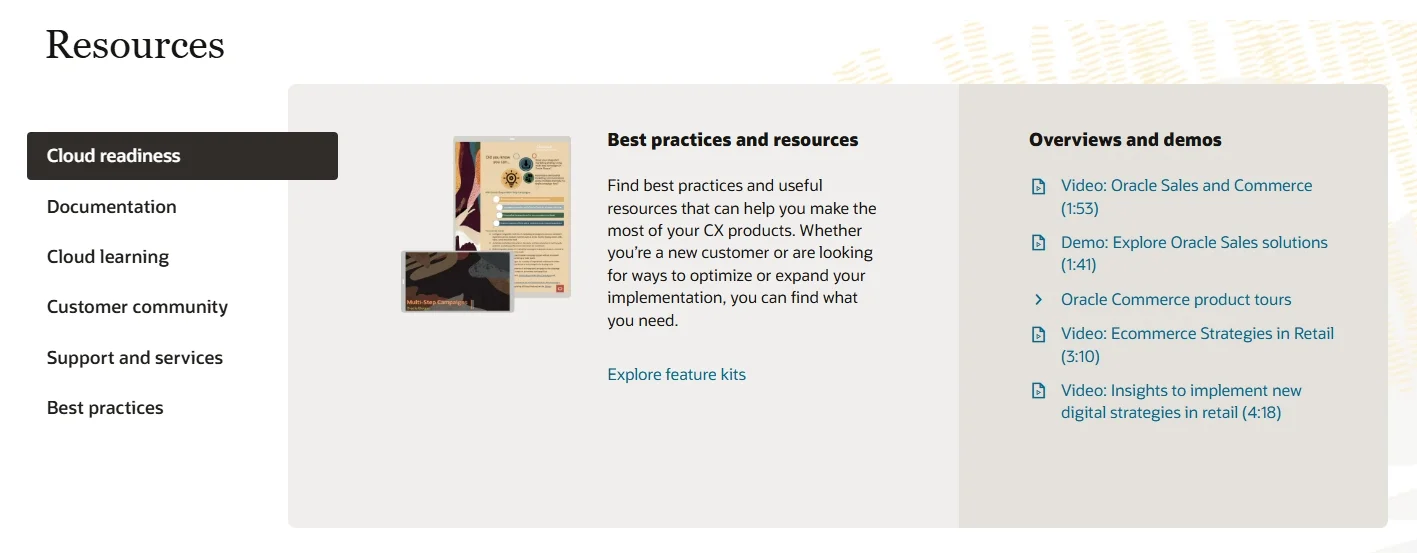
Additionally, Oracle’s support team often works proactively to identify and resolve potential problems, minimizing downtime for businesses. The platform also offers detailed documentation, training programs, and access to Oracle’s community of enterprise users.
Magento (open-source version), in contrast, relies heavily on its community-driven support model. As an open-source platform, it does not include official support packages unless businesses opt for Adobe Commerce. Instead, Magento users can access a wealth of resources through an active global community, including forums, tutorials, and detailed documentation.

This community-driven model is beneficial for smaller businesses and developers looking for cost-effective solutions. However, resolving complex issues may require hiring a developer or working with a Magento partner agency, which can incur additional costs.
➤ The verdict:
When comparing Oracle Commerce vs Magento in terms of support, Oracle Commerce takes the lead for businesses needing reliable, professional assistance with guaranteed response times. Its robust support offerings, combined with proactive monitoring and SLAs, make it ideal for large businesses with critical operations that cannot afford prolonged downtime.
Oracle Commerce vs Magento – FAQs
What are some Magento alternatives?
Some popular alternatives to Magento include Shopify, WooCommerce, BigCommerce, and PrestaShop. These platforms offer different features and pricing structures, catering to a variety of business sizes and needs. Each alternative has unique strengths, so it’s essential to evaluate them based on your business goals.
What is the difference between Magento and Oracle Commerce?
The key difference between Magento and Oracle Commerce lies in their target audience and functionality. Magento is highly flexible, cost-effective, and ideal for small to medium-sized businesses or enterprises requiring extensive customization.
Oracle Commerce, on the other hand, is tailored for large enterprises with complex needs, offering advanced integrations, robust B2B tools, and enterprise-level security.
What is Magento now called?
Magento is now part of Adobe and is officially known as Adobe Commerce. However, the open-source version of the platform retains the name Magento. Adobe Commerce includes additional enterprise features, such as advanced analytics, enhanced customer personalization, and priority support, which are not available in the free Magento open-source version.
Is Oracle Commerce expensive?
Yes, Oracle Commerce is considered expensive compared to other eCommerce platforms. Its licensing fees, implementation costs, and ongoing maintenance expenses are significant, reflecting its advanced features and capabilities designed for large enterprises.
Final Verdict
To conclude, choosing between Oracle Commerce vs Magento depends on your business’s size, resources, and eCommerce goals. Each platform excels in different areas, catering to distinct audiences with unique requirements.
Ultimately, if your business requires advanced capabilities and has the resources to manage a high-cost platform, Oracle Commerce is the better choice. For those prioritizing flexibility, scalability, and a lower cost of ownership, Magento is the superior option. By aligning your business’s needs with the strengths of these platforms, you can choose the one that best supports your growth and operational goals. Whether you want to migrate your store to Oracle or Magento, LitExtension has a dedicated migration service for both.
If you like this article, please don't hesitate to check out other Magento articles on our LitExtension website for more expert tips and insights.

